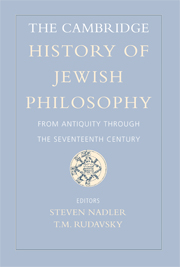Book contents
- Frontmatter
- Introduction
- 1 Texts and Contexts
- II Logic and Language
- III Natural Philosophy
- 9 Matter, Form, and the Corporeal World
- 10 Cosmology: The Heavenly Bodies
- 11 Miracles
- 12 Time, Space, and Infinity
- 13 Exhalations and Other Meteorological Themes
- IV Epistemology and Psychology
- V Metaphysics and Philosophical Theology
- VI Practical Philosophy
- Biobibliographical Appendix
- Bibliography
- Index
- References
11 - Miracles
from III - Natural Philosophy
Published online by Cambridge University Press: 28 May 2009
- Frontmatter
- Introduction
- 1 Texts and Contexts
- II Logic and Language
- III Natural Philosophy
- 9 Matter, Form, and the Corporeal World
- 10 Cosmology: The Heavenly Bodies
- 11 Miracles
- 12 Time, Space, and Infinity
- 13 Exhalations and Other Meteorological Themes
- IV Epistemology and Psychology
- V Metaphysics and Philosophical Theology
- VI Practical Philosophy
- Biobibliographical Appendix
- Bibliography
- Index
- References
Summary
Jewish philosophy has been defined as “the confrontation or encounter of the nonphilosophic Jewish sources and the non-Jewish philosophic sources.” In its medieval stage, Jewish philosophy is therefore concerned with the conflict between biblical and rabbinic literature, on the one hand, and Greek philosophical literature as transmitted by Islamic philosophers, on the other hand. The biblical and rabbinic corpuses represent different stages in Jewish spirituality, and each body of literature articulates multiple perspectives. Likewise, Greek philosophers differ on seminal philosophical and theological issues. Nevertheless, one can distinguish between the general orientation of the biblical–rabbinic tradition and the Greco–Islamic philosophical tradition toward anthropological, cosmological, and theological questions – particularly regarding the role of speculation in obtaining human perfection and the relationship between God and nature. It is the navigating between these differing worldviews that occupies center stage in the drama of medieval Jewish philosophy.
Medieval Jewish philosophers then devoted particular attention to the subjects in which the divergence was greatest. One issue that particularly captures the differing theological conceptions between the biblical–rabbinic tradition and the Greco–Islamic philosophical tradition is miracles. Indeed, in his depiction of the fundamental difference in their understanding of God, Galen, the well-known secondcentury Greek physician and philosopher, pointed to the contrasting approaches of Greek philosophy and the Jewish Bible to miracles and creation:
It is precisely this point in which our own opinion and that of Plato and of the other Greeks who follow the right method in natural science differs from the position taken up by Moses.
- Type
- Chapter
- Information
- The Cambridge History of Jewish PhilosophyFrom Antiquity through the Seventeenth Century, pp. 362 - 387Publisher: Cambridge University PressPrint publication year: 2008



